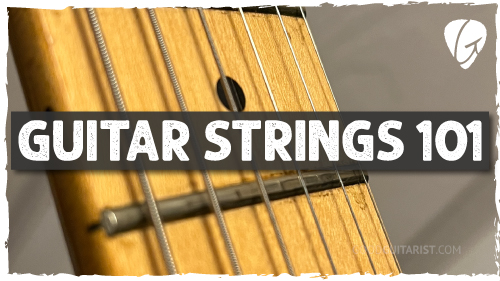When You Should Change Your Guitar Strings + Tips To Make Them Last Longer
Everything you need to know about guitar strings!
Today I want to answer some simple questions about guitar strings that every guitarist should know. How often should you change your strings? How can you make your strings last longer? What kind of strings do you need for your acoustic guitar? For electric guitar?
First, let’s talk about how often you should change your strings. For regular players, it’s recommended to change your strings every 3-6 months, or sooner if you notice they sound dull or feel grimy. If you play daily or perform frequently, you might need to change them even more often, perhaps every 4-8 weeks. Fresh strings have a brighter tone and are easier to play, so keeping them in good condition is crucial for both sound quality and playability.
To make your strings last longer, there are a few simple tips you can follow. After each practice session, wipe down your strings with a clean cloth to remove sweat and oils from your fingers, which can corrode the strings over time. Washing your hands before playing can also help reduce the amount of grime that gets transferred to the strings. Using string conditioners or lubricants can further protect them from wear and tear. Additionally, storing your guitar in a case when not in use helps protect it from dust and humidity, both of which can shorten the lifespan of your strings.
When it comes to selecting the right strings for your guitar, it depends on whether you have an acoustic or electric guitar. For acoustic guitars, phosphor bronze and 80/20 bronze strings are popular choices. Phosphor bronze strings offer a warm, balanced tone and good durability, while 80/20 bronze strings provide a brighter, more vibrant sound. Choose a gauge that suits your playing style: lighter gauges (e.g., .011-.052) are easier to play and bend, making them suitable for beginners, while medium or heavier gauges (e.g., .012-.054) produce a fuller sound at the cost of being tougher to play. I prefer the sound of lighter strings however, so it’s really up to the individual.
For electric guitars, nickel-plated steel strings are the most common choice, offering a bright tone with a balanced feel. Pure nickel strings provide a warmer, vintage sound and are preferred by some players for their smoother feel. As with acoustic guitars, the gauge of your strings affects playability and tone. Lighter gauges (e.g., .009-.042) are easier to bend and play fast leads, while heavier gauges (e.g., .010-.046) offer more sustain and a thicker tone, better suited for rhythm playing and lower tunings.
These basic guitar tips will help your strings last longer, stay bright and shiny, and ensure you have the right strings for your guitar, making it more fun and easy to play! By taking care of your strings (and your guitar!) and choosing the right type, you’ll enjoy better sound quality and a more enjoyable playing experience.
Table of Contents
- 0:00 – Intro
- 0:47 – How Often Should I Change My Guitar Strings?
- 3:38 – How To Make Guitar Strings Last Longer!
- 6:07 – What Kind of Strings Do I Need For My Guitar?
All-Access Pass
Start your 10-day FREE trial
- Step-By-Step Courses
- Exclusive YouTube Bonuses
- Q&A with James






